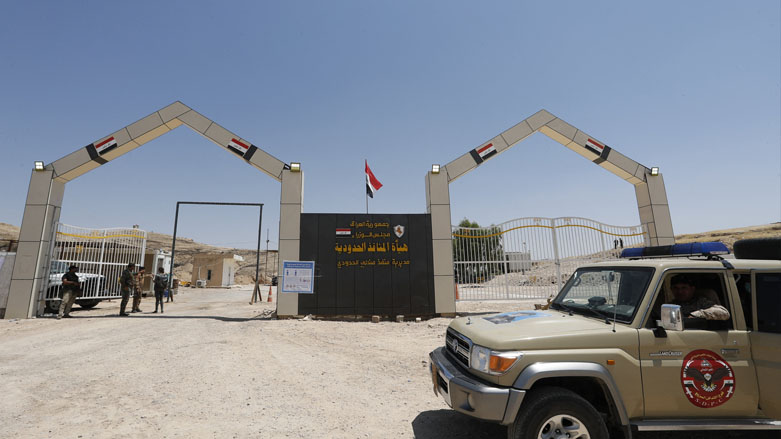'Worse than a jungle': the cartel controlling Iraqi borders

Along Iraq's borders, a corrupt customs-evasion cartel is diverting billions of dollars away from state coffers to line the pockets of armed groups, political parties and crooked officials.
The prime beneficiaries are Iran-linked Shia paramilitaries that intimidate federal officials who dare obstruct them, sometimes through chillingly specific death threats, a six-month AFP investigation has found.
The network is so well-oiled and entrenched that revenues are parcelled out among rival groups with remarkably little friction, part of a parallel system that Iraq's finance minister has described as "state plunder."
"It's indescribable," said one Iraqi customs worker. "Worse than a jungle. In a jungle, at least animals eat and get full. These guys are never satisfied."
Like most of the government officials, port workers and importers interviewed for this story, this worker cited threats to his life and asked to speak anonymously.
The network they described arises from Iraq's glacially slow bureaucracy, fractious politics, limited non-oil industry and endemic corruption that is itself largely a product of years of chaos in the wake of the 2003 US invasion to topple dictator Saddam Hussein.
Customs provide one of the few sources of state revenues, and to keep disparate groups and tribes happy, many of them close to Iran, entry points are divvied up among them and federal duties largely supplanted by bribes.
"There's a kind of collusion between officials, political parties, gangs and corrupt businessmen," Iraq's Finance Minister Ali Allawi told AFP.
Paramilitary Groups
Many of Iraq's entry points are informally controlled by groups within the Hashed al-Shaabi, a powerful state-sponsored armed network close to Iran, as well as other armed factions, officials confirmed to AFP.
The Hashed's members, their allies or their relatives work as border agents, inspectors or police, and are paid by importers who want to skip the official process entirely or get discounts.
"If you want a shortcut, you go to the militias or parties," said an Iraqi intelligence agent who has investigated customs evasion.
He said importers effectively tell themselves: "I'd rather lose $100,000 [on a bribe] than lose my goods altogether."
The Hashed publicly denies the claims. But sources close to its hardline member groups Asaib Ahl al-Haq and Kataeb Hezbollah acknowledged that customs posts are indeed parcelled out in the manner alleged.
They cited specific harbor berths, land crossings and products that matched what customs officials and the intelligence agent told AFP.
$10,000 a Day in Bribes
The Mandali crossing on the Iranian border, for example, is run by the Badr Organization, an Iraqi movement founded in Iran, port workers, officials and analysts confirmed.
An official there boasted to AFP that a border operative can rake in $10,000 per day in bribes, the bulk of which is distributed to the overseeing armed group and complicit officials.
In other cases, an armed group controls a particular kind of trade.
"If I'm a cigarette trader," he said, "I go to Kataeb Hezbollah's economic office in the Jadriyah neighbourhood [of Baghdad], knock on the door, and say: 'I want to coordinate with you.'"
One key figure is always the "mukhalles" – the state customs agent assigned to an incoming shipment who often doubles as a middleman for an armed group.
"There's no such thing as a neutral mukhalles. They're all backed by parties," the intelligence agent said.
Once paid – in cash for smaller operations, and by bank wire for larger deals – the mukhalles tampers with paperwork.
By misrepresenting the type or amount of goods imported or their value, the customs fee is sharply reduced.
One importer told AFP that under-declaring quantities could score a trader discounts of up to 60 percent.
A Real Mafia
With points of entry seen as cash cows, public servants pay their superiors for postings, especially at Umm Qasr.
"Minor clerks' jobs in some outposts change hands for $50,000 to $100,000, and sometimes it goes up to multiples of that," Allawi, the finance minister, lamented.
The subterfuge around the import system "contributes to state plunder," he told AFP.
To protect their pillaging, parties and armed groups use their political influence and threats of violence.
A worker at Mandali told AFP he once delayed a shipment from Iran because of missing paperwork, but then allowed it through, duty-free, after the mukhalles handling the cargo brandished his credentials as a Hashed member.
The intelligence officer said an informant at Zerbatiya crossing, which likewise borders Iran and is managed by Asaib Ahl al-Haq, was repeatedly put on leave for blocking efforts to import Iranian produce customs-free and eventually relented.
"We came back later to talk to him again and found he had joined Asaib," the intelligence officer said.
A senior member of Iraq's border commission told AFP he receives regular calls from private numbers threatening his relatives by name, in an effort to intimidate him into halting cargo inspections.
The customs worker was among others who also said they contended with death threats.
"We can't say anything because we'll be killed," he said. "People are afraid. This is a real mafia."
